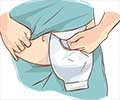Sleep Disorders in Elderly - Glossary
Hypnotics: Sleep-inducing drugs.
Insomnia: Difficulty in initiating and maintaining Sleep.
Nap: Short period of planned sleep during the day. The need for a nap usually results from a lack of nighttime sleep.
Restless Legs Syndrome (RLS):A sleep disorder characterized by a creeping sensation in the legs that occurs when a person is lying still in bed. The sensation results in an irresistible urge to move or jerk the leg.
Obstructive Sleep Apnea: A sleep disorder, characterized by a temporary cessation of breath, caused by a periodic obstruction to the respiratory passages cutting off airflow through the nose and mouth.
Arousal: Awakening from sleep. Also sometimes refers to a change from a "deeper" stage of non-REM sleep to a "lighter" stage.
Delta sleep: Stage of sleep in which EEG delta waves are prevalent or predominant (sleep stages 3 and 4, respectively). Called "slow wave" sleep because brain activity slows down dramatically from the "theta" rhythm of Stage 2 to a much slower rhythm of 1 to 2 cycles per second called "delta" and the height or amplitude of the waves increases dramatically.
Excessive daytime sleepiness (EDS): (also "excessive daytime somnolence") - Subjective report of difficulty in staying awake, accompanied by a ready entrance into sleep when the individual is sedentary.
Light sleep: Term used in clinical practice to describe non-REM stage 1, and sometimes, stage 2 sleep. People in light sleep drift in and out of sleep and can be awakened easily.
Sleep hygiene: Conditions and practices that promote continuous and effective sleep. These include bedtime routines, regular bed and arise times. And regularly getting enough sleep to avoid sleepiness during the day.












